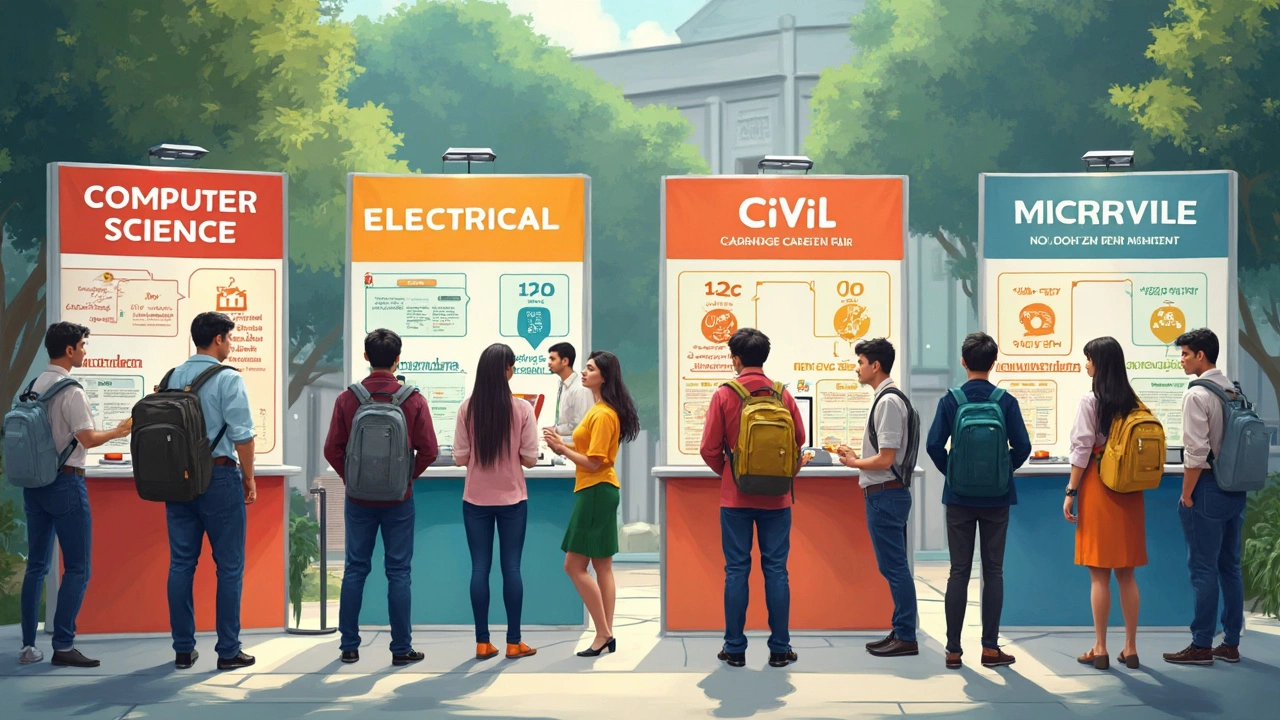Everyone wants to know: which IIT JEE branch is actually the best? Truth is, there’s no universal answer—what works for your friend might not work for you at all. Let’s cut straight to it: making the right choice can shape your entire college experience, job hunt, and even your happiness down the line. Yet, every year, students pick branches based on what their seniors did, what their parents think sounds impressive, or just because of last-minute panic. That’s a risky move.
Here’s the thing—each branch has its own perks. Computer Science is always hot because of fat salary packages and fancy job titles, but tons of students in branches like Chemical, Aerospace, or even Metallurgy have landed jobs at top startups, consultancies, or research labs. If you look at placement stats from IIT Bombay in 2024, you’ll see students from Mechanical scored international offers too, not just the coders.
If you’re prepping for the IIT JEE (or even just daydreaming about it), figuring out which branch fits your interests, strengths, and goals saves you a lot of trouble later. Ignore the crowd pressure. Take some time to know what each branch is really like—what subjects you’ll be stuck with, what summer internships look like, and the kind of people who usually go for it. Your future self will thank you.
- Cracking the Hype: Why Branch Choices Matter
- The All-Stars: Most Popular IIT Branches (and Why)
- Unexpected Winners: Offbeat Branches with Top Careers
- How Placements and Salaries Stack Up
- Smart Tips for Picking Your Perfect Branch
Cracking the Hype: Why Branch Choices Matter
So, let's talk straight about why your IIT JEE branch really matters—way more than just a line on your admission form. Picking a branch can decide the skills you learn, the companies that come knocking during placements, and even the friends you make. The catch? Most folks don't look past stereotypes. "CS is for money! Civil is old-school!" You’ve probably heard it all. But check placement data, and the story gets interesting.
Here's a quick look at how different branches perform across IITs each year. It’s not just about salaries, but internship offers, international jobs, and future study opportunities—all stack up differently depending on the branch.
| Branch | Average Salary (INR, 2024) | Top Recruiting Industries | Popular Higher Study Options |
|---|---|---|---|
| Computer Science | 28 LPA | Tech, Startups, Consulting | MS (US/Europe), MBA, Research |
| Electrical | 20 LPA | Core Engineering, Finance, Research | MS, MTech, MBA |
| Mechanical | 14 LPA | Automotive, Consulting, Manufacturing | MS, MTech |
| Chemical | 12 LPA | Chemicals, Oil & Gas, FMCG | MS, MBA |
Notice the gap? Sure, Computer Science stands out, but a lot of Electrical and even Mechanical grads end up switching to finance or tech later. What you study gives you a foundation, but industry links and placement culture for each branch shape those first big career steps.
Here are a few reasons students often regret random choices:
- Assuming you'd "adjust" with any subjects, but later losing interest
- Ignoring how competitive or chill the peer group gets in certain branches
- Not checking out latest placement trends—things change every 2-3 years
Don’t make your decision based just on what’s trending. Ask seniors and check each IIT’s branch stats for the most recent year. Take a good look at the IIT JEE counseling process. Prioritize your personal interests, not the neighbor’s brag-list. The hype is real, but solid info beats rumors every time.
The All-Stars: Most Popular IIT Branches (and Why)
If you ask around right after JEE results, one branch pops up everywhere: Computer Science Engineering (CSE). No surprises here—this branch sits at the top because tech giants like Google, Microsoft, and Amazon keep hiring like crazy and offer jaw-dropping salaries. But it isn’t all about CSE. Electronics and Electrical Engineering, Mechanical Engineering, and sometimes Chemical and Civil make headlines too, each for their own reasons.
Here’s what makes these branches stand out:
- IIT JEE rankers usually scramble for Computer Science first. In 2024, at IIT Bombay, the opening rank for CSE was literally under 70 (yeah, out of more than a million candidates). That’s how nuts the competition is.
- Electronics and Electrical Engineering comes in next—and not just because of jobs in electronics. Many students use this as a launchpad into coding or finance. Places like IIT Delhi and Kharagpur see their electrical students getting placed at banks, consulting, and even tech companies, not just power plants.
- Mechanical Engineering isn’t just about machines and engines anymore. These grads often end up in analytics, product design, or even big tech. For instance, in 2024, close to 25% of IIT Madras mechanical grads jumped ship to tech startups or management roles.
- Chemical and Civil Engineering still attract students who want core jobs (like in refineries or construction), but you’d be shocked at how many go on to work in data science or even start upselling apps after graduation.
Now, if you want to see what kind of offers these popular branches are getting, take a peek at this table summarizing 2024 stats from top IITs:
| Branch | Median Salary (INR, lakhs/yr) | Top Recruiters | Unique Opportunities |
|---|---|---|---|
| Computer Science | 36 | Google, Microsoft, Quadeye | International placements, software roles everywhere |
| Electronics/Electrical | 26 | Texas Instruments, Intel, Goldman Sachs | Banking, VLSI, hardware + software jobs |
| Mechanical | 19 | Tesla, Tata Steel, McKinsey | Analytics, core jobs, consulting |
| Chemical | 16 | Reliance, Shell, ITC | FMCG, Energy, analytics, non-core jobs |
| Civil | 14 | L&T, Schlumberger, PwC | Project management, consulting, infrastructure |
Each branch draws a different crowd, too. CSE attracts coders and algorithm lovers, Electrical has math fans, and Mechanical folks often like to take things apart. So while the salary numbers and recruiters are cool, what matters just as much is what you want to actually build or solve for a living.

Unexpected Winners: Offbeat Branches with Top Careers
When most people hear 'IIT JEE,' their minds go straight to Computer Science or Electronics. But honestly, there’s a whole world beyond these crowded branches, and some so-called 'offbeat' options are quietly producing some of the happiest—and best-paid—graduates.
Take Mathematics and Computing at IIT Delhi. Believe it or not, in 2024, the average CTC (cost to company) for this small batch was even higher than a few mainstream branches, clocking in at around Rs. 28 lakh per year. Recruiters from finance, analytics, and even Silicon Valley startups are scouting these grads because of their core math and coding skills. Biomedical Engineering at IIT Bombay is another sleeper hit: alumni have gone on to work at global healthcare giants and secure research roles at places like the MIT Media Lab. If tech meets biology excites you, this is a solid pick.
Let's talk about Engineering Physics. It may sound niche, but ex-students from IIT Madras and Kharagpur are now working at firms like Google and Qualcomm. Why? Their problem-solving and research skills make them perfect for R&D, deep-tech, and roles that demand more than basic coding.
Here’s a quick look at how a few offbeat branches stack up in job offers and average salaries in 2024:
| Branch | Average CTC (Rs. Lakhs) | Popular Sectors |
|---|---|---|
| Mathematics & Computing | 28 | Finance, Analytics, Product, Software |
| Engineering Physics | 22 | Deep-Tech, Data Science, R&D |
| Biomedical Engineering | 18 | Healthcare Tech, Research, Biotech |
| Materials Science | 15 | Automotive, Aerospace, Electronics |
So, what’s the takeaway? If you’re open to these best branch options, you might face less competition and still bag a top-notch job. Lots of top companies want versatile thinkers, not just coders. Plus, you’ll find more space to do cool research, join quirky student groups, or chase internships abroad—all of which can open doors you wouldn’t expect.
- Talk to current students or recent alumni from these branches before you make a call.
- Check summer internship stats (they often hint at final placements).
- Don’t ignore your gut. If you love a subject, chances are you’ll thrive—and companies notice that passion.
Going off the beaten track isn’t risky anymore—it’s actually smart, provided you know what you’re aiming for.
How Placements and Salaries Stack Up
Everyone hears about the crazy packages from IIT placements, but most folks don’t realize how different things look across branches. Here’s something real: at places like IIT Bombay and IISc Bangalore, the highest offers for Computer Science went above ₹2 crore per year in 2024, but only a handful land these headline spots. Average salaries across branches tell a better story.
IIT JEE aspirants often run after Computer Science, but top non-CS branches have been catching up fast. Mechanical, Electrical, and Chemical branches at the big IITs now see average offers between ₹20-28 lakh per year. In fact, in 2024, at IIT Madras, more than 80% of Mechanical students got placed, and core engineering jobs are back in demand thanks to EV startups and manufacturing going digital.
| Branch | Highest CTC (2024, INR) | Average CTC (2024, INR) | Placement % |
|---|---|---|---|
| Computer Science | 2.3 crore | 36 lakh | 98% |
| Electrical | 1.1 crore | 28 lakh | 90% |
| Mechanical | 93 lakh | 22 lakh | 83% |
| Chemical | 75 lakh | 20 lakh | 80% |
| Civil | 52 lakh | 16 lakh | 77% |
Now, here’s something most people don’t say out loud: everyone wants a big paycheck, but not every branch is just about salary. Computer Science, for example, attracts a lot of global tech firms, so students do get a shot at Silicon Valley or Europe. On the flipside, if you love building real stuff, core branches like Mechanical, Electrical, or Civil still give you great careers in India and abroad—sometimes with less stress and better work-life balance.
- For those aiming for research or higher studies, branches like Physics, Mathematics, or Biotechnology often come with lower offers initially but open doors to PhD programs and scholarships abroad.
- Startups and finance roles are hiring from almost all branches now. Having a CS degree is no longer a must for many hot jobs.
- Placement rates depend a lot on the economy, campus reputation, and how active you are during internships. Don’t just look at numbers; see how past students from your chosen IIT branch moved on after their first jobs.
Quick tip: check the latest placement reports on official IIT websites, not just what random forums say. Some branches at smaller IITs have stellar records in niche areas like Materials or Energy, if you look closely.

Smart Tips for Picking Your Perfect Branch
This decision isn’t just about marks or chasing the IIT JEE crowd—it’s about real fit. So, how do you get it right when the pressure is on? Try these simple yet proven ways to land a branch you won’t regret in a couple of years.
- Know What You’re Signing Up For: Dive into each branch’s core syllabus. For example, Computer Science will drown you in algorithms and coding, while Electrical is heavy on circuits and theory. Don’t just go by the branch name, check the actual courses and project work.
- Match with Long-Term Goals: If you’re eyeing an MBA, branches like Civil or Chemical often have lighter loads, giving you time for CAT prep. If you’re into cutting-edge tech or startups, Computer Science or Electrical make more sense.
- Placements Aren’t Everything: Yes, placement stats can help. In 2024, IIT Delhi Computer Science saw an average CTC of over ₹28 LPA, but some Mechanical grads landed core jobs abroad while others switched to non-core roles paying nearly as much.
- Talk to Alumni: Networking helps. Message folks on LinkedIn who’ve graduated from your target branches at different IITs. Their stories will show you what the classroom and actual job market feel like.
- Don’t Ignore Your Strengths: If you hate coding or can’t stand chemistry labs, face it before it’s too late. Your natural abilities can make or break your college life.
Check out this quick snapshot comparing the top four branches at popular IITs in 2024:
| Branch | Avg. Package (₹ LPA) | Top Recruiters | Core Subjects |
|---|---|---|---|
| Computer Science | 28.6 | Google, Microsoft, Flipkart | Algorithms, Programming, Machine Learning |
| Electrical | 20.2 | Texas Instruments, Samsung, Qualcomm | Circuits, Signal Processing, Power Systems |
| Mechanical | 15.8 | Ola Electric, Tata Motors, GE | Thermodynamics, Design, Manufacturing |
| Chemical | 13.5 | Shell, Reliance, Honeywell | Process Engineering, Chemistry, Plant Design |
Bottom line: don’t just chase trends. Dig for what actually fits your interests, abilities, and career dreams. You’ll spend four years with this branch—make the choice count for you, not for some faceless stat.



